Unit 13 We're trying to save the earth!Section A(Grammar-4c)课件(共24张PPT) 人教版英语九年级全册
文档属性
| 名称 | Unit 13 We're trying to save the earth!Section A(Grammar-4c)课件(共24张PPT) 人教版英语九年级全册 | 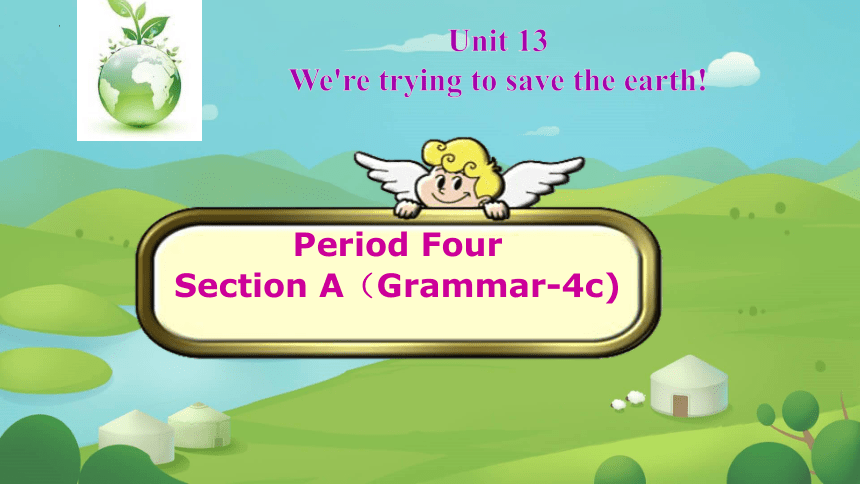 | |
| 格式 | pptx | ||
| 文件大小 | 1.1MB | ||
| 资源类型 | 教案 | ||
| 版本资源 | 人教新目标(Go for it)版 | ||
| 科目 | 英语 | ||
| 更新时间 | 2024-09-16 14:25:38 | ||
图片预览

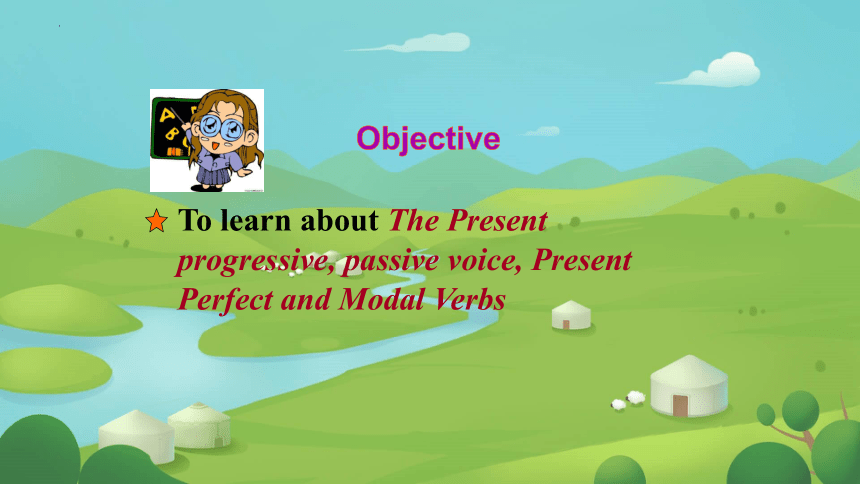
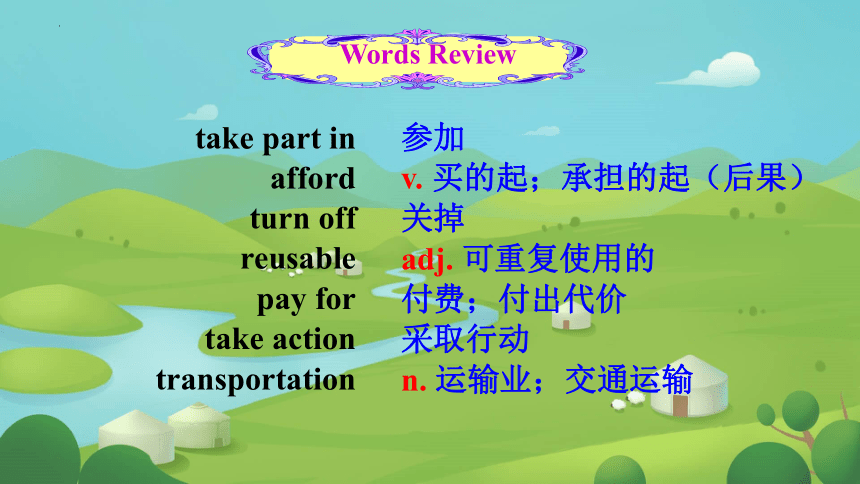
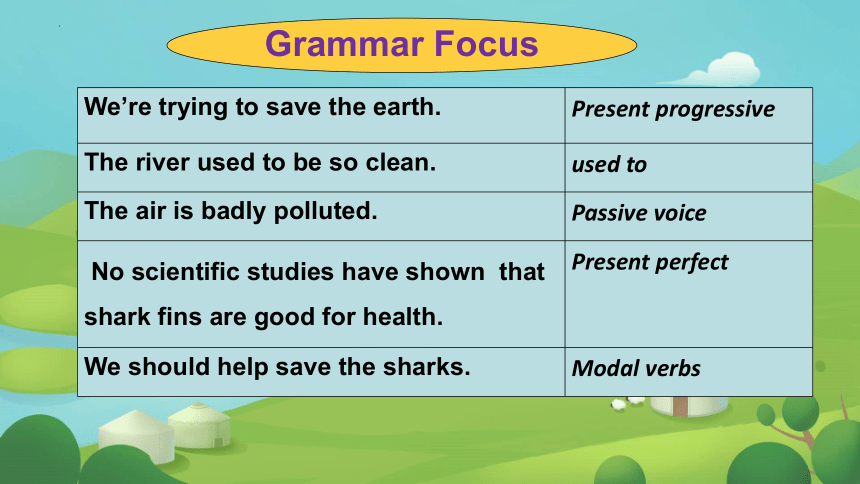
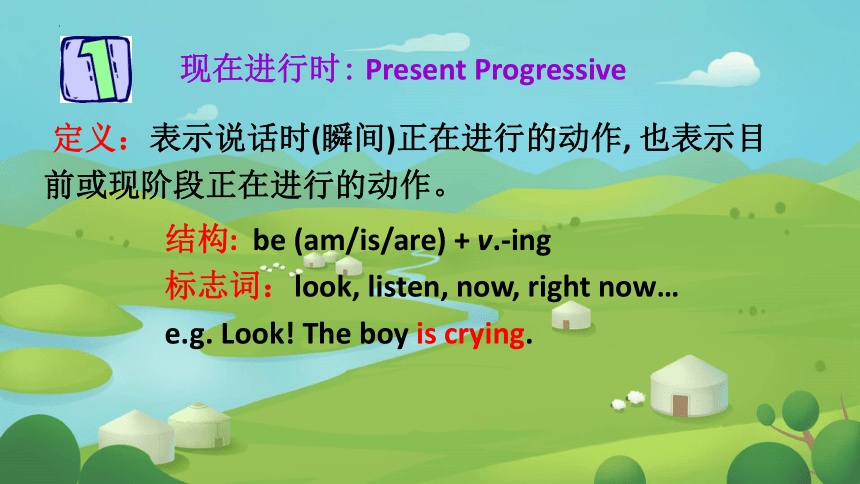

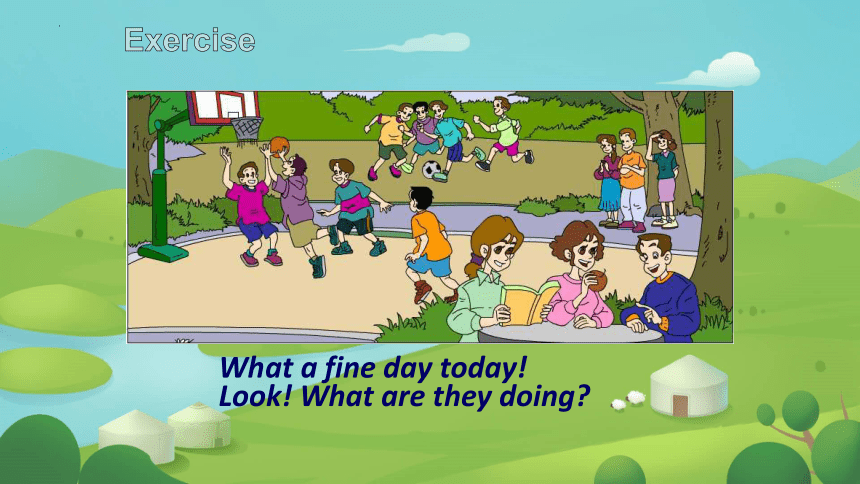
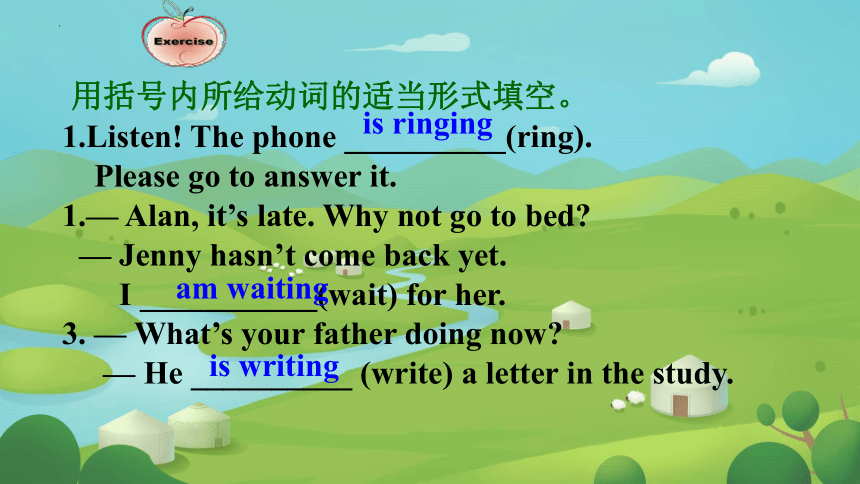
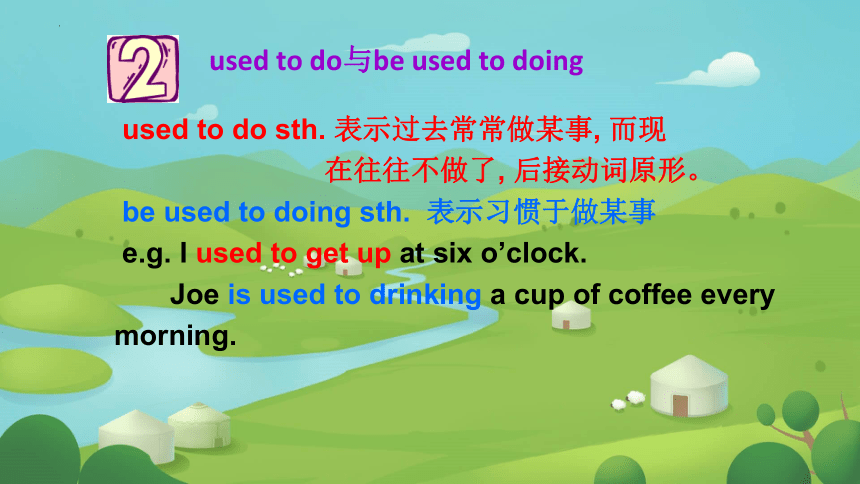
文档简介
(共24张PPT)
Unit 13
We're trying to save the earth!
Period Four
Section A(Grammar-4c)
Objective
To learn about The Present progressive, passive voice, Present Perfect and Modal Verbs
take part in
afford
turn off
reusable
pay for
take action
transportation
参加
v. 买的起;承担的起(后果)
关掉
adj. 可重复使用的
付费;付出代价
采取行动
n. 运输业;交通运输
Words Review
Grammar Focus
We’re trying to save the earth. Present progressive
The river used to be so clean. used to
The air is badly polluted. Passive voice
No scientific studies have shown that shark fins are good for health. Present perfect
We should help save the sharks. Modal verbs
现在进行时: Present Progressive
结构: be (am/is/are) + v.-ing
标志词:look, listen, now, right now…
e.g. Look! The boy is crying.
定义:表示说话时(瞬间)正在进行的动作, 也表示目前或现阶段正在进行的动作。
1)与always, all the time等副词连用,表示动作反复或习惯。此时句子常含有说话者的强烈情感在内。表达较强的“责备”或“表扬”之意。
① You are always changing your mind.
你总是主意不定。(太烦人了。)
② He is always helping others.
他总是帮助别人。(他真是个好人。)
现在进行时--用法
2) 对于come, go, leave, arrive, start等表示位置移动的动词常可用进行时态表将来。
① He is leaving on Wednesday.
他将于周三离开。
② Mary isn’t here at the moment.
She is coming later.
玛丽现在不在这儿,她一会儿来。
What a fine day today!
Look! What are they doing
Exercise
用括号内所给动词的适当形式填空。
Listen! The phone __________(ring).
Please go to answer it.
— Alan, it’s late. Why not go to bed
— Jenny hasn’t come back yet.
I ___________(wait) for her.
3. — What’s your father doing now
— He __________ (write) a letter in the study.
is ringing
am waiting
is writing
used to do sth. 表示过去常常做某事, 而现
在往往不做了, 后接动词原形。
be used to doing sth. 表示习惯于做某事
e.g. I used to get up at six o’clock.
Joe is used to drinking a cup of coffee every morning.
used to do与be used to doing
Translation.
1. 她过去常常周末和朋友闲逛。
2. 他习惯于每天晚上熬夜。
Exercise
She used to hang out with friends on weekends.
He is used to staying up every night.
被动语态:Passive voice
定义:表示主语是动作的承受者,即行
为动作的对象的一种语态。
结构:be + 过去分词
e.g. A new school was built last year.
Our classroom is cleaned every day.
The first section of New College
English is designed for speaking practice
and is based on pictures and topics.
These computers were made in our own country last year.
Shall we be asked to attend the opening ceremony
①一般现在时的被动语态:am/is/are + 过去分词
②一般过去时的被动语态:was/were+过去分词
③一般将来时的被动语态:will/shall+be+过去分词
Translate the sentences by using Passive voice.
1. 刚才一些老年人参观了博物馆。
2. 工人们使用不同种类的机器工作。
The museum was visited by some old people just now.
Different kinds of machines are used to work by the workers.
Exercise
用括号内所给动词的适当形式填空。
1. The Secondary School Entrance
Exams _______ (hold) in June.
2. A strange noise __________ (hear) by
his mother last night.
3. A wide road _____________ (build)
between the two villages by those
people next year.
is held
was heard
will be built
结构: has/have + 过去分词
标志词:already, yet, ever, never, since, for…
e.g. I haven’t finished my homework yet.
定义:表示动作已经完成, 但对现在造成影
响; 或者表示从过去某一时间开始一
直延续到现在并还可能持续下去的动作。
现在完成时: Present Perfect
Complete the following sentences.
I _________ (be) in Beijing for two years.
2. I _____ never _____ (hear) of that man before.
3. Tom __________ (work) there since two years ago.
4. The twins ___________ (wash) the clothes for an hour.
5. He _________ (play) basketball since three years ago.
6. How long ____ Sally _____ (sing) yet
have been
have
heard
has worked
Exercise
have washed
has played
has
sung
1. 情态动词本身有一定的词义, 表示说话人的情绪、态度或语气,
但不能单独作谓语, 只能与其他动词构成谓语。
常见的有: can (could), may (might), must, need,
shall (should), will (would)等。
2. 情态动词无人称和数的变化, 后接动词原形。否定式是在情态动词后面加not。
个别情态动词有过去式形式, 可用来表达
更加客气、委婉的语气。
e.g. Ken can climb up the trees like a koala.
Tracy could ride a bicycle when she was five years old.
You mustn’t play with fire. It is dangerous.
情态动词
Translation.
1. 我们不能在教室里吃东西。
2. 首先你必须完成作业。
3. 他现在不可能在家。
4. 她一定知道这个问题的答案。
Exercise
We can’t eat in the classroom.
You must finish your homework first.
He can’t be at home now.
She must know the answer to this question.
4a
Fill in the blanks with the correct forms of the verbs in brackets.
Joe: _____ you ever ______ (take) part in
an environmental project
Eric: Yes, I have. I ______ (help) with a
Clean-Up Day last year. It was
__________ (consider) the biggest
clean-up project this city ____ ever
____ (have).
Have
taken
helped
considered
had
had
参加
Joe: How many people ____ (take) part
Eric: I _____ (think) more than 1,000 people ______
(come) to help out.
Joe: That’s fantastic! I guess everyone in this city is ______ (try) to improve the environment.
Eric: Yes, we can’t afford to ____ (wait)
any longer to take action!
took
think
came
trying
wait
v. 承担得起(后果); 买得起
electricity by turning off the lights when
you leave a room. You ______ also use
reusable bags instead of plastic bags. I think it’s a great idea that you now ______ pay for plastic bags in some stores. And instead of driving to school or work, you __________ ride your bike or walk. If it’s far, you __________ take the bus. All these
could
have to
can/should
can/could
关掉
adj.可重复使用的
付费;付出代价
small things ______ add up and become big things that _________ improve the environment. Let’s
take action now!
could
would/can
采取行动
4c
Make a list of things that people can do to help the environment and discuss your list with your partner.
use public transportation (n.交通运输); …
I think that everyone should use public transportation.
I disagree. It’s difficult for parents with young children to use public transportation…
Thank you for your attention!
Unit 13
We're trying to save the earth!
Period Four
Section A(Grammar-4c)
Objective
To learn about The Present progressive, passive voice, Present Perfect and Modal Verbs
take part in
afford
turn off
reusable
pay for
take action
transportation
参加
v. 买的起;承担的起(后果)
关掉
adj. 可重复使用的
付费;付出代价
采取行动
n. 运输业;交通运输
Words Review
Grammar Focus
We’re trying to save the earth. Present progressive
The river used to be so clean. used to
The air is badly polluted. Passive voice
No scientific studies have shown that shark fins are good for health. Present perfect
We should help save the sharks. Modal verbs
现在进行时: Present Progressive
结构: be (am/is/are) + v.-ing
标志词:look, listen, now, right now…
e.g. Look! The boy is crying.
定义:表示说话时(瞬间)正在进行的动作, 也表示目前或现阶段正在进行的动作。
1)与always, all the time等副词连用,表示动作反复或习惯。此时句子常含有说话者的强烈情感在内。表达较强的“责备”或“表扬”之意。
① You are always changing your mind.
你总是主意不定。(太烦人了。)
② He is always helping others.
他总是帮助别人。(他真是个好人。)
现在进行时--用法
2) 对于come, go, leave, arrive, start等表示位置移动的动词常可用进行时态表将来。
① He is leaving on Wednesday.
他将于周三离开。
② Mary isn’t here at the moment.
She is coming later.
玛丽现在不在这儿,她一会儿来。
What a fine day today!
Look! What are they doing
Exercise
用括号内所给动词的适当形式填空。
Listen! The phone __________(ring).
Please go to answer it.
— Alan, it’s late. Why not go to bed
— Jenny hasn’t come back yet.
I ___________(wait) for her.
3. — What’s your father doing now
— He __________ (write) a letter in the study.
is ringing
am waiting
is writing
used to do sth. 表示过去常常做某事, 而现
在往往不做了, 后接动词原形。
be used to doing sth. 表示习惯于做某事
e.g. I used to get up at six o’clock.
Joe is used to drinking a cup of coffee every morning.
used to do与be used to doing
Translation.
1. 她过去常常周末和朋友闲逛。
2. 他习惯于每天晚上熬夜。
Exercise
She used to hang out with friends on weekends.
He is used to staying up every night.
被动语态:Passive voice
定义:表示主语是动作的承受者,即行
为动作的对象的一种语态。
结构:be + 过去分词
e.g. A new school was built last year.
Our classroom is cleaned every day.
The first section of New College
English is designed for speaking practice
and is based on pictures and topics.
These computers were made in our own country last year.
Shall we be asked to attend the opening ceremony
①一般现在时的被动语态:am/is/are + 过去分词
②一般过去时的被动语态:was/were+过去分词
③一般将来时的被动语态:will/shall+be+过去分词
Translate the sentences by using Passive voice.
1. 刚才一些老年人参观了博物馆。
2. 工人们使用不同种类的机器工作。
The museum was visited by some old people just now.
Different kinds of machines are used to work by the workers.
Exercise
用括号内所给动词的适当形式填空。
1. The Secondary School Entrance
Exams _______ (hold) in June.
2. A strange noise __________ (hear) by
his mother last night.
3. A wide road _____________ (build)
between the two villages by those
people next year.
is held
was heard
will be built
结构: has/have + 过去分词
标志词:already, yet, ever, never, since, for…
e.g. I haven’t finished my homework yet.
定义:表示动作已经完成, 但对现在造成影
响; 或者表示从过去某一时间开始一
直延续到现在并还可能持续下去的动作。
现在完成时: Present Perfect
Complete the following sentences.
I _________ (be) in Beijing for two years.
2. I _____ never _____ (hear) of that man before.
3. Tom __________ (work) there since two years ago.
4. The twins ___________ (wash) the clothes for an hour.
5. He _________ (play) basketball since three years ago.
6. How long ____ Sally _____ (sing) yet
have been
have
heard
has worked
Exercise
have washed
has played
has
sung
1. 情态动词本身有一定的词义, 表示说话人的情绪、态度或语气,
但不能单独作谓语, 只能与其他动词构成谓语。
常见的有: can (could), may (might), must, need,
shall (should), will (would)等。
2. 情态动词无人称和数的变化, 后接动词原形。否定式是在情态动词后面加not。
个别情态动词有过去式形式, 可用来表达
更加客气、委婉的语气。
e.g. Ken can climb up the trees like a koala.
Tracy could ride a bicycle when she was five years old.
You mustn’t play with fire. It is dangerous.
情态动词
Translation.
1. 我们不能在教室里吃东西。
2. 首先你必须完成作业。
3. 他现在不可能在家。
4. 她一定知道这个问题的答案。
Exercise
We can’t eat in the classroom.
You must finish your homework first.
He can’t be at home now.
She must know the answer to this question.
4a
Fill in the blanks with the correct forms of the verbs in brackets.
Joe: _____ you ever ______ (take) part in
an environmental project
Eric: Yes, I have. I ______ (help) with a
Clean-Up Day last year. It was
__________ (consider) the biggest
clean-up project this city ____ ever
____ (have).
Have
taken
helped
considered
had
had
参加
Joe: How many people ____ (take) part
Eric: I _____ (think) more than 1,000 people ______
(come) to help out.
Joe: That’s fantastic! I guess everyone in this city is ______ (try) to improve the environment.
Eric: Yes, we can’t afford to ____ (wait)
any longer to take action!
took
think
came
trying
wait
v. 承担得起(后果); 买得起
electricity by turning off the lights when
you leave a room. You ______ also use
reusable bags instead of plastic bags. I think it’s a great idea that you now ______ pay for plastic bags in some stores. And instead of driving to school or work, you __________ ride your bike or walk. If it’s far, you __________ take the bus. All these
could
have to
can/should
can/could
关掉
adj.可重复使用的
付费;付出代价
small things ______ add up and become big things that _________ improve the environment. Let’s
take action now!
could
would/can
采取行动
4c
Make a list of things that people can do to help the environment and discuss your list with your partner.
use public transportation (n.交通运输); …
I think that everyone should use public transportation.
I disagree. It’s difficult for parents with young children to use public transportation…
Thank you for your attention!
同课章节目录
- Unit 1 How can we become good learners.
- Section A
- Section B
- Unit 2 I think that mooncakes are delicious!
- Section A
- Section B
- Unit 3 Could you please tell me where the restroom
- Section A
- Section B
- Unit 4 I used to be afraid of the dark.
- Section A
- Section B
- Unit 5 What are the shirts made of?
- Section A
- Section B
- Review of Units 1-5
- Unit 6 When was it invented?
- Section A
- Section B
- Unit 7 Teenagers should be allowed to choose their
- Section A
- Section B
- Unit 8 It must belong to Carla.
- Section A
- Section B
- Unit 9 I like music that I can dance to.
- Section A
- Section B
- Unit 10 You're supposed to shake hands.
- Section A
- Section B
- Review of Units 6-10
- Unit 11 Sad movies make me cry.
- Section A
- Section B
- Unit 12 Life is full of the unexpected
- Section A
- Section B
- Unit 13 We're trying to save the earth!
- Section A
- Section B
- Unit 14 I remember meeting all of you in Grade 7.
- Section A
- Section B
- Review of Units 11-14
